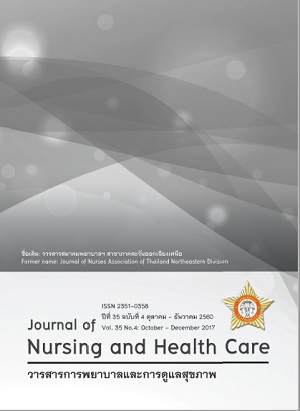ผลของการนิเทศทางคลินิกต่อการใช้กระบวนการพยาบาล ในการดูแลผู้ป่วยเบาหวานและความพึงพอใจของพยาบาล Effects of Clinical Supervision on the Application of Nursing Process in Caring of Diabetic Patients and Nurses’Satisfaction
คำสำคัญ:
การนิเทศทางคลินิก, การใช้กระบวนการพยาบาล, การดูแลผู้ป่วยโรคเบาหวาน, ความพึงพอใจของพยาบาล, clinical supervision application of nursing process caring of patients with diabetes nurse’s satisfactionบทคัดย่อ
การวิจัยครั้งนี้เป็นการวิจัยกึ่งทดลอง เพื่อศึกษาผลของการนิเทศทางคลินิกต่อการใช้กระบวนการพยาบาลในการดูแลผู้ป่วยโรคเบาหวาน และความพึงพอใจในการนิเทศของพยาบาล โดยใช้แนวคิดการนิเทศทางคลินิกของพร็อคเตอร์ ประกอบด้วย การนิเทศตามมาตรฐาน การนิเทศเพื่อพัฒนาความรู้ความสามารถ และการนิเทศเพื่อธำรงรักษา กลุ่มตัวอย่างเลือกแบบเฉพาะเจาะจงเป็นพยาบาลวิชาชีพประจำคลินิกโรคเรื้อรัง งานการพยาบาลผู้ป่วยนอก โรงพยาบาลชุมชนแห่งหนึ่ง จำนวน 6 คน และเวชระเบียนผู้ป่วยเบาหวานที่มารับการรักษาจำนวน 24 ราย ดำเนินการวิจัยโดยการประชุมกลุ่มก่อนเริ่มกิจกรรมการนิเทศเพื่อวิเคราะห์ปัญหา แนวทางการแก้ปัญหา และกำหนดเป้าหมายการใช้กระบวนการพยาบาลในการดูแลผู้ป่วยโรคเบาหวานร่วมกัน กิจกรรมการนิเทศทางคลินิก ประกอบด้วย การประชุมปรึกษาเชิงเนื้อหา การสอนแนะ การให้คำปรึกษา และการประชุมปรึกษาทางการพยาบาล ใช้เวลา 2 สัปดาห์ เก็บรวบรวมข้อมูลโดยใช้แบบประเมินการใช้กระบวนการพยาบาลในการดูแลผู้ป่วยโรคเบาหวาน และแบบสอบถามความพึงพอใจในการนิเทศ ซึ่งมีค่าความเที่ยงเท่ากับ 0.80 และ 0.96 ตามลำดับ วิเคราะห์ข้อมูลโดยใช้สถิติเชิงบรรยาย แสดงค่าความถี่ ร้อยละ ค่าพิสัย ค่าเฉลี่ยและส่วนเบี่ยงเบนมาตรฐาน และสถิติวิเคราะห์โดยใช้ Wilcoxon Signed Rank Test ผลการวิจัยพบว่าภายหลังได้รับการนิเทศทางคลินิก พยาบาลมีคะแนนเฉลี่ยอันดับการใช้กระบวนการพยาบาลในการดูแลผู้ป่วยโรคเบาหวานสูงกว่าก่อนได้รับการนิเทศทางคลินิกอย่างมีนัยสำคัญทางสถิติ (p<.001) และมีคะแนนความพึงพอใจในการนิเทศเฉลี่ย ร้อยละ 89 ผลการศึกษาชี้ให้เห็นว่าการนิเทศทางคลินิกทำให้พยาบาลได้พัฒนาการใช้กระบวนการพยาบาลในการดูแลผู้ป่วยโรคเบาหวานและมีความพึงพอใจในการนิเทศ จึงควรนำรูปแบบการนิเทศทางคลินิกที่เน้นการสร้างสัมพันธภาพ และการมีส่วนร่วมในการวางแผน กำหนดเป้าหมายในการปฏิบัติการพยาบาลมาใช้ในการพัฒนาการใช้กระบวนการพยาบาลในการดูแลผู้ป่วย เพื่อพัฒนาคุณภาพการบริการพยาบาลต่อไป
The purpose of this quasi-experimental study was to determine the effects of clinical supervision on the application of nursing process in caring of patients with diabetes and nurse’s satisfaction. Proctor’s three functions interactive model consisted of normative, formative and restorative clinical supervision was used as a conceptual framework of this study. The purposive sample consisted of 6 professional nurses in chronic disease clinic, out-patient department of a community hospital and twenty-four diabetic patient medical records were purposively selected. Before the beginning of clinical supervision, group meeting was set to analyze the problem of using nursing process for caring diabetic patients, and set goal and means to solve the problems. The clinical supervision in two weeks consisted of nursing’s content conference, coaching, counseling, and nursing care conference. Data were collected using the application of nursing process in caring of patients with diabetes questionnaires, and nurse’s satisfaction to clinical supervision questionnaires. The reliability of the questionnaires were 0.80 and 0.96 respectively. Data were analysed by using descriptive statistics: frequency, percentage, range, mean, and standard deviation; and analytical statistics with Wilcoxon Signed Rank Test.
The results revealed that after receiving clinical supervision, the mean rank of application of nursing process in caring of patients with diabetes scores were statistically significantly higher than those prior the supervision.(p<.001) and nurses’ satisfaction to clinical supervision mean scores were 89%. The results indicated that clinical supervision could enhance nurses’ application of nursing process in caring of patients with diabetes, and nurses’ satisfaction on clinical supervision. Therefore, the clinical supervision, emphasizing on good relationship and participation in planning and goal setting in nursing practice, should be used to maximize the application of nursing process in caring of patients to improve the quality of nursing practice.



